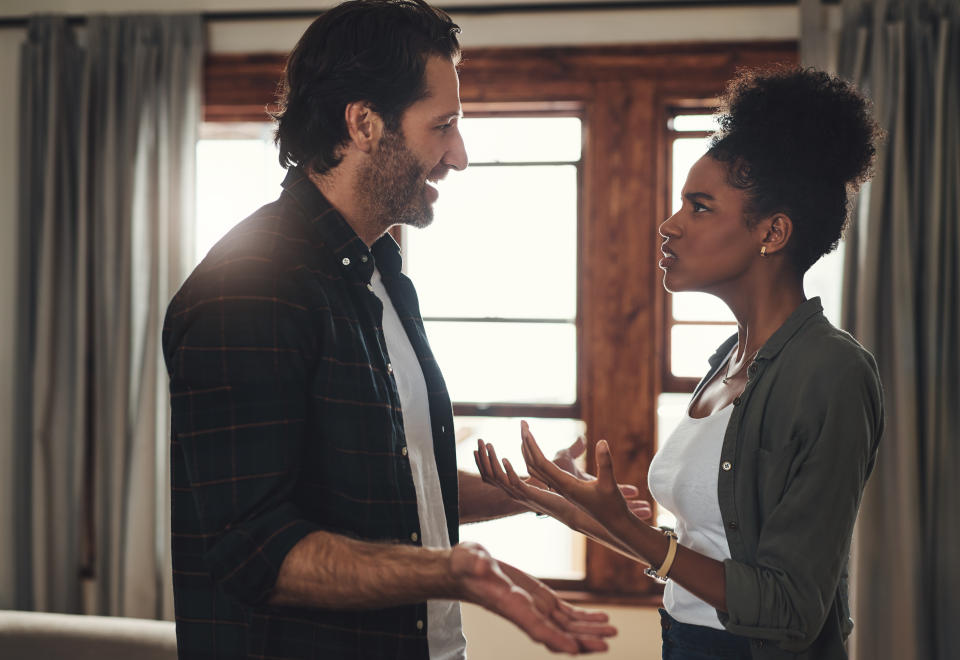Coronavirus breakups: Warning signs your relationship is at risk
With the daily number of new coronavirus cases at a record-breaking high in Victoria and outbreaks increasing in both NSW and Queensland, it looks like we’re all going to be spending a lot more time indoors.
While the day-to-day impact of COVID-19 self-isolation certainly hits hard, it also has a subtler yet no less powerful effect on things like our sleeping habits, mood and relationships with others — particularly romantic partners.
During trying times such as a pandemic, couples tend to fall into two groups explains Joanne Wilson, a neuropsychotherapist and relationship specialist.

The first group are ‘productive and happy’ couples that have ‘flourished and even strengthened’ during the pandemic.
“[They] have had an understanding that threats will often rock their love boat and that adult love is conditional, is tested and requires on-going maintenance,” Wilson tells Yahoo Lifestyle.
In the second group are couples — particularly parents — who tended to cruise on what Wilson calls ‘auto-pilot’ before the pandemic threw their love boat into stormy seas.
She says: “Whilst children are certainly not a precursor to couples lacking quality time, many parents were in a state of complacency, distracted by their badge of honour of busyness, adhering to hectic child schedules and full-time work.
“When they did collide, they often barely tolerated each other though held onto the rare moments of connection and keeping it together for the children.”

Jane and Max’s story
But when the outbreak of COVID-19 forced schools and workplaces to close and families to hunker down at home, the time was ripe for unresolved tensions between partners to be thrown into the spotlight.
Here, Wilson offers insight into the relationship breakdown of a real-life married couple, Jane and Max*, who were confronted with issues they’d ‘ignored for many years’ while in the vacuum of self-isolation.
Jane and Max are both in senior positions in their respective careers with two children in senior school. Neither of their divorced parents had wealth so they were determined to make a better life for themselves and their children.
Before COVID-19, their days were packed full as they expertly scheduled in after school activities in each other’s calendars. They eagerly volunteered time to their children’s sporting endeavours. Exhausted over many evenings, they’d self-medicate with a little too much wine that fuelled fierce accusatory arguments over roles and responsibilities. Over time, they built resentment through lack of inattentiveness to each other’s love needs, however, their commitments kept them distracted.
Jane and Max’s unexpected time together throughout social distancing had them ill-equipped to deal with their conflict, stacked with concerns over finances. Add the frequency of alcohol consumption and their protective ‘walls’ were elevated to great new heights.
They were too hurt and angry to share their inner world both longing for loving emotional attentiveness. To avoid arguing in front of their teenagers, they spiralled into toxic silence. Neither was prepared to be vulnerable and Jane’s hope for any reconnection was extinguished.
Max felt neglected in the bedroom and Jane felt she had been let down too many times — both felt hopeless about ever being able to count on each other. Max moved out.

Caring for your relationship during COVID-19
Wilson shares her advice for ensuring that your relationship lasts through coronavirus — and beyond.
“Healthy couples approach adversity by ensuring they consistently check-in on their alliance with a shared vision based on values that feature respect and kindness,” she says.
Wilson encourages couples to focus on a ‘healthy and assertive approach’ to conflict and even ask advice from those flourishing couples they respect.
Be conscious of not falling into the trap of replicating the ‘unhealthy relationship habits and divorce’ from previous generations, either.
“Of course, ensure you have the courage to adopt a ‘help-seeking’ mentality when you can’t move forward and find a trusted therapist for an unbiased perspective with someone who can impart well-researched tools,” she adds.
*names may have been changed to protect identity.
Sign up to our daily newsletter here to get all the latest news and hacks. Or get in touch at lifestyle.tips@verizonmedia.com.

 Yahoo Lifestyle
Yahoo Lifestyle 



